Corpun file 25455 at www.corpun.com
Lake City Journal, Florida, 7 May 2012
Corporal punishment in school becomes a controversial topic at Shining Star Academy of the Arts
By Karl Burkhardt
Corporal punishment in school became a controversial topic when Anthony J. Buzzella, Principal of Shining Star Academy of the Arts, was asked about school policy. The policy is written in a contract with parents.
Buzzella responded by explaining state law concerning corporal punishment.
"As a school administrator in the state of Florida, I have the option to administer corporal punishment as a means of reinforcing the inappropriateness of unacceptable behavior. This does not mean I WILL use it. The law simply gives me that option. Yes, Shining Star will enforce the highest standards of appropriate behavior. We will not tolerate disrespect, improper language or behavior from our students," Buzzella wrote in response to the question.
"However, I have no plans to use corporal punishment as a general rule," he wrote. "PARENTS are responsible for sending their children to school ready to learn. STUDENTS will not be given the option to act out in our school. Personally, I prefer to reward positive behavior."
Some parents expected a firm policy against corporal punishment, not a legal statement. They expected the charter school to be different from public schools.
Alex L. Carswell, Jr., Assistant Superintendent for Columbia County Schools, said corporal punishment, which means paddling, is used only in elementary schools and only with written permission of parents. It is used less than once a month among the eight schools.
He said that some children, knowing that they could be paddled, avoid behavior that could result in paddling. When it is used, it is in an office with adults as witnesses.
Because corporal punishment is only used when parents give written permission, it is not an issue, Carswell said. Other forms of discipline are most often used.
On a local Facebook page, parents reacted strongly against the idea that their children could be paddled at Shining Star Academy of the Arts.
"For anyone still considering The Shining Star Academy for your children's education: I need to inform you that I recently received a 'Parent Contract' and a 'Student Contract,' to be signed and returned. They both state that 'corporal punishment will be administered to my child when deemed necessary by the school principal.' I will NOT be sending my children to the shining star academy of the arts," wrote an irate parent.
"That is ridiculous!! Lord help them the first time they touch one of my kids!!" another parent responded.
"Unreal! Welcome back to the 18th century. I'm starting to gravitate towards homeschooling ...." wrote another.
Just glad I'm finding out about it now, and not after they've started. Blake has been pretty good to the kids, it's Shining Star that worries me."
Buzzella wrote, "As a charter school of choice, we do not have to keep disruptive students in our school. Should a student's behavior become too inappropriate or disruptive, I think their dismissal as a student at our school would be more likely than corporal punishment.
"I trust this clarifies my position on corporal punishment. Please feel free to contact me personally at: tony@maddfest.com if further clarification is needed."
A Question-and-Answer publication from the school included:
Q: Will parents be able to opt out of corporal punishment?
A: Yes, you can opt out. You may write this into the contract if you wish. For those who are in favor of corporal punishment, we will notify the parent before it is administered. No teacher has any authority to paddle. Only the Principal can administer, and he does not like it, and would only use it with permission. Corporal punishment is an option as it is the law in Columbia County."
Posted: Monday, May 7, 2012
Article comment by: Terry Rauch
I am a supporter of school corporal punishment. When I advised my
son (who's 27 now) that whoever was in charge of his well being,
had my authority to paddle him if he was rude or defiant. He
learned that respect of the law and respect for others rights
should be observed. I have learned in life that there are things
I can't teach my son but life can. The end result, my son is
married, owns a home, has children and a successful career. To my
surprise, he employs corporal punishment to his children as I
did towards him. He told me, "Dad it was the best thing you could have ever done for me."
Content ©2007-2014 Lake City Journal
Corpun file 23972 at www.corpun.com
![]()
The Charlotte Observer, N. Carolina, 8 May 2012
Burke leaders ban paddling in schools
By April Bethea
 Click to enlarge |
Burke school employees can no longer paddle students who misbehave, after school board members voted Monday to ban corporal punishment.
The Burke school board voted 5 to 2 to overturn its old policy allowing paddling, which some members have previously said could cause liability issues for the district.
But board member R.L. Icard said he worried about taking away options for principals. "It's not being used very much," Icard said. "But ... some children do respond to that better than they do other things."
The district's old policy allowed corporal punishment to be used if parents or guardians were notified first and a follow-up letter was sent to the student's home. But the Morganton News Herald reported in March that principals had been asked not to use corporal punishment the past three years.
According to the News Herald, Burke had been one of 17 districts across the state to allow corporal punishment before Monday's vote.
RELATED VIDEO CLIP
Two-minute news segment from local TV station WSOC9-TV, Charlotte NC, 7 May 2012. It reports on the end of corporal punishment in Burke County, but finds a majority of parents spoken to there are in favor of paddling. A member of the school board, who opposes the abolition move, also speaks.
HERE IS THE CLIP:
This video clip is not currently available.
IMPORTANT: Copyright in this video material rests with the original copyright holders. This brief excerpt is reproduced under the "fair use" doctrine
for private, non-profit, historical research and education purposes only. It must not be redistributed or republished in any commercial context.
Corpun file 24013 at www.corpun.com
![]()
USA Today, Washington DC, 8 May 2012
Today's debate: Corporal punishment
Spare the child, part with rod
Our View: End spanking in public schools
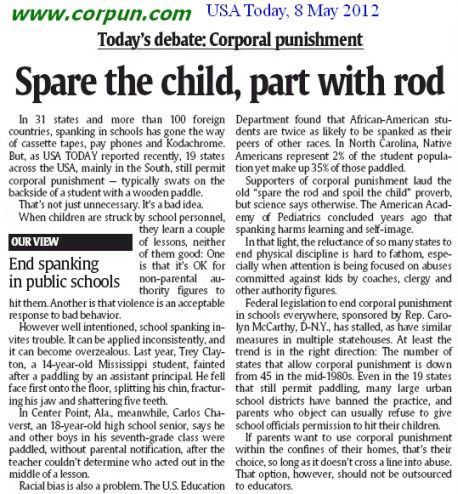 Click to enlarge |
In 31 states and more than 100 foreign countries, spanking in schools has gone the way of cassette tapes, pay phones and Kodachrome. But, as USA TODAY reported recently, 19 states across the USA, mainly in the South, still permit corporal punishment -- typically swats on the backside of a student with a wooden paddle.
That's not just unnecessary. It's a bad idea.
When children are struck by school personnel, they learn a couple of lessons, neither of them good: One is that it's OK for non-parental authority figures to hit them. Another is that violence is an acceptable response to bad behavior.
However well intentioned, school spanking invites trouble. It can be applied inconsistently, and it can become overzealous. Last year, Trey Clayton, a 14-year-old Mississippi student, fainted after a paddling by an assistant principal. He fell face first onto the floor, splitting his chin, fracturing his jaw and shattering five teeth.
In Center Point, Ala., meanwhile, Carlos Chaverst, an 18-year-old high school senior, says he and other boys in his seventh-grade class were paddled, without parental notification, after the teacher couldn't determine who acted out in the middle of a lesson.
Racial bias is also a problem. The U.S. Education Department found that African-American students are twice as likely to be spanked as their peers of other races. In North Carolina, Native Americans represent 2% of the student population yet make up 35% of those paddled.
Supporters of corporal punishment laud the old "spare the rod and spoil the child" proverb, but science says otherwise. The American Academy of Pediatrics concluded years ago that spanking harms learning and self-image.
In that light, the reluctance of so many states to end physical discipline is hard to fathom, especially when attention is being focused on abuses committed against kids by coaches, clergy and other authority figures.
Federal legislation to end corporal punishment in schools everywhere, sponsored by Rep. Carolyn McCarthy, D-N.Y., has stalled, as have similar measures in multiple statehouses. At least the trend is in the right direction: The number of states that allow corporal punishment is down from 45 in the mid-1980s. Even in the 19 states that still permit paddling, many large urban school districts have banned the practice, and parents who object can usually refuse to give school officials permission to hit their children.
If parents want to use corporal punishment within the confines of their homes, that's their choice, so long as it doesn't cross a line into abuse. That option, however, should not be outsourced to educators.
School spanking
These 19 states allow corporal punishment:
Alabama
Arizona
Arkansas
Colorado
Florida
Georgia
Idaho
Indiana
Kansas
Kentucky
Louisiana
Mississippi
Missouri
North Carolina
Oklahoma
South Carolina
Tennessee
Texas
Wyoming
Source: The Center for Effective Discipline
© 2012 USA TODAY, a division of Gannett Co. Inc.
Corpun file 24012 at www.corpun.com
![]()
USA Today, Washington DC, 8 May 2012
Preserve the paddle
Opposing view: Spanking deters misbehavior
By Kenneth T. Whalum Jr.
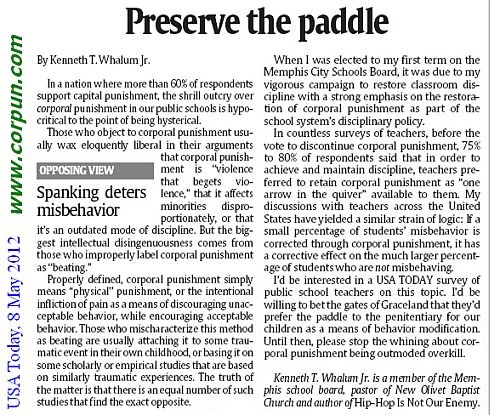 Click to enlarge |
In a nation where more than 60% of respondents support capital punishment, the shrill outcry over corporal punishment in our public schools is hypocritical to the point of being hysterical.
Those who object to corporal punishment usually wax eloquently liberal in their arguments that corporal punishment is "violence that begets violence," that it affects minorities disproportionately, or that it's an outdated mode of discipline. But the biggest intellectual disingenuousness comes from those who improperly label corporal punishment as "beating."
Properly defined, corporal punishment simply means "physical" punishment, or the intentional infliction of pain as a means of discouraging unacceptable behavior, while encouraging acceptable behavior. Those who mischaracterize this method as beating are usually attaching it to some traumatic event in their own childhood, or basing it on some scholarly or empirical studies that are based on similarly traumatic experiences. The truth of the matter is that there is an equal number of such studies that find the exact opposite.
When I was elected to my first term on the Memphis City Schools Board, it was due to my vigorous campaign to restore classroom discipline with a strong emphasis on the restoration of corporal punishment as part of the school system's disciplinary policy.
In countless surveys of teachers, before the vote to discontinue corporal punishment, 75% to 80% of respondents said that in order to achieve and maintain discipline, teachers preferred to retain corporal punishment as "one arrow in the quiver" available to them. My discussions with teachers across the United States have yielded a similar strain of logic: If a small percentage of students' misbehavior is corrected through corporal punishment, it has a corrective effect on the much larger percentage of students who are not misbehaving.
I'd be interested in a USA TODAY survey of public school teachers on this topic. I'd be willing to bet the gates of Graceland that they'd prefer the paddle to the penitentiary for our children as a means of behavior modification. Until then, please stop the whining about corporal punishment being outmoded overkill.
Kenneth T. Whalum Jr. is a member of the Memphis school board, pastor of New Olivet Baptist Church and author of Hip-Hop Is Not Our Enemy.
© 2012 USA TODAY, a division of Gannett Co. Inc.
RELATED VIDEO CLIP
Three-minute item from Fox local TV station in Memphis, 8 May 2012. This features an interview with Rev. Kenneth Whalum, prompted by his above piece in USA Today. Speaking to Fox's Darrell Greene, he expands on his arguments in favor of paddling at school. (Apologies for a small glitch in the middle of this video.)
HERE IS THE CLIP:
This video clip is not currently available.
IMPORTANT: Copyright in this video material rests with the original copyright holders. This brief excerpt is reproduced under the "fair use" doctrine
for private, non-profit, historical research and education purposes only. It must not be redistributed or republished in any commercial context.
Corpun file 24010 at www.corpun.com

Beaumont Enterprise, Texas, 9 May 2012
The paddle has been swung in SETx schools 1,500 times this school year
By David Henry
Beaumont Enterprise

While every Southeast Texas school practices several methods of punishment, the paddle is still used on many campuses. Parents are generally notified before corporal punishment is used on their child. Photo taken Friday, May 4, 2012 Photo: Guiseppe Barranco, STAFF PHOTOGRAPHER / The Beaumont Enterprise
 17-year-old Ozen High School football star Raleigh Johnson in action in November 2011, around the time of his encounter with Coach Nelson's paddle. After the spanking, his grades improved. (Pic not from this article but from Beaumont Enterprise website sports pages) |
Raleigh Johnson was dreading fifth period. He knew what was coming.
Because of a failing grade in his Spanish class, Johnson readied himself to be on the receiving end of two swats from a nearly foot-long wooden paddle.
"It didn't feel good at all," recalled Johnson, 17, now a junior and a football player at Ozen High School.
Still, coach Jeff Nelson "got it through my head" that grades were important, he said.
The paddling happened last fall. Since then, Johnson, who carries a 3.5 grade-point average, hasn't brought home a grade lower than a B on a report card.
Many view corporal punishment -- physical pain as a form of discipline -- as an outdated practice.
But it still is used on a daily basis in Southeast Texas school districts -- at least 1,500 times this school year, according to public records requests.
Who still paddles?
Aside from private schools, only one school district in the area, Port Arthur ISD, claims to not use corporal punishment.
"Our message to the teachers and principals is it is never, ever OK to touch a student," said deputy superintendent Mark Porterie.
The Port Arthur school district issued an apology in March after parents of students at Travis Elementary claimed the principal, Bessie Johnson, lined up some fifth-graders and, according to what one student told police, hit him on the back with her closed fist. The police report said the student told them other children also were hit after they performed poorly on a test.
Johnson is still employed by the district. Porterie said he could not discuss what, if any, disciplinary action was taken against Johnson because it is a "personnel issue."
All area schools give parents the option to provide a written notice at the beginning of the school year if they do not want their child to be paddled. If they change their minds, the notice is retractable at any time.
This has been the practice for many years, long before a state law went into effect in September giving parents the right to opt out of corporal punishment.
Tameka Newman, a parent of a South Park Middle School sixth-grader, said she would rather paddle her child than have a school employee do it.
"I do not believe schools should be doing that," Newman said, and her daughter is on the no-paddle list at South Park.
Most parents choose not to opt out, though, judging by district records.
The East Chambers school district, which serves 1,315 students, received 25 no-paddle requests this year, according to superintendent Scott Campbell.
"A lot of our high school students actually prefer to be paddled," Campbell said. "To them, they'd rather take a few swats than come up here for a Saturday detention."
Why do we spank?
 Odis Norris, the principal of South Park Middle School said he uses corporal punishment with parental permission to avoid the students missing class through suspension. Photo taken Thursday, May 3, 2012 Photo: Guiseppe Barranco, STAFF PHOTOGRAPHER / The Beaumont Enterprise |
Students can be paddled for a number of discipline problems, including public display of affection or a dress code violation.
Of the 133 paddling incidents at Vidor High School this school year, the two most frequent causes were insubordination and excessive tardies.
South Park Middle School principal Odis Norris, who has been at that Beaumont campus since 2004, says paddling is never used as a first option, and they instead start by contacting the parents. His school, with 360 students, has used paddling 207 times so far this school year.
Norris says corporal punishment has been an effective form of discipline at his school, adding that it works better than suspensions -- which he can't even give unless parents approve.
"Many people these days try to make paddling a negative thing," Norris said. "It's why a lot of schools are out of control. You have a professional staff member doing it. It is quick, it is effective, it lights a fuse."
Norris points out the numerous awards and achievements his school has earned, including being rated as "Recognized" by the Texas Education Agency as recently as 2010. His school's scores on the statewide assessment test are higher than the state and Beaumont ISD averages, despite 91.7 percent of the student body being classified as "economically disadvantaged" by the Texas Education Agency.
Students at South Park must wear uniforms, a green or white shirt and blue jeans with no holes. After eating breakfast in the school cafeteria, they walk in a single-file line to the auditorium every morning where they have 30 minutes of silent reading or study time, supervised by Norris and other teachers and administrators.
Norris then gives the morning announcements and often offers words of encouragement before sending them on their way to class. The school is structured and organized, and administrators from across the state have come to visit and see what makes Norris' school so successful, according to Norris. He said his programs are now being modeled by other schools in the district as well.
"There aren't many discipline problems here," said Lawrence Marks, whose South Park sixth-grader has been paddled for not wearing a belt. "(Corporal punishment) is needed in certain kids. When you take it away from them, like they do at the high school (Ozen), then you get fights where police have to be called like my daughter was telling me about happening (on April 27)."
But Marks added that 207 times in one year "seems a little excessive to me."
Danielle Lerma, who has two nephews at South Park Middle School, said one of them was paddled for leaving class to use the rest room without permission while the other one was paddled for not attending assigned tutorials.
"I agree with them (paddling for missing tutorials); he deserved it," Lerma said. "But I do not believe you should punish kids (for leaving to use the rest room), especially when they have an emergency. They should let them go -- no questions asked."
Norris said no students are paddled or disciplined if they need to use the rest room. The school's policy allows students to leave to use the rest room whenever they need to go, but they must tell the teacher before they leave, he said.
Punishment at South Park is balanced with positive reinforcement, according to Norris. Students who receive an 80 or higher in all of their classes each six weeks are presented with a certificate and honored at an awards ceremony that parents are invited to attend.
At the end of May, the school is taking a field trip to Splashtown water park in Houston. All of the students who aren't in in-school suspension that day get to go.
"The (punishment) is only a small part about why we have been so successful," Norris said. "You can't just paddle and expect it to work. You have to show support and that you care for them, like a parent would."
Sparing the rod
There is no agency that keeps track of paddling in schools or how many districts still use it, said DeEtta Culbertson, Texas Education Agency spokeswoman. Several major school districts, such as Austin ISD and Houston ISD, have banned the practice.
It is being used less in many area schools. As of May 1, Vidor High School used a paddle 324 fewer times than in the previous school year. Instances of paddling have been on the decline in the Port Neches-Groves school district since the 2008-2009 school year, according to records.
Tanner Hunt, who has been an attorney for several local school districts the past 35 years, said he remembers children getting lined up in the gym to receive swats at Dick Dowling Junior High when he was in school. He can also recall a shop teacher who drilled holes in the middle of paddles used on students to allow the boards to travel faster and inflict more pain.
"It was a part of life," said Hunt, who among other districts represents Silsbee ISD, which has paddled just 12 times this year. "I'm so glad we have moved past that. We have found better ways to get students' attention."
Several Beaumont ISD schools, including Central High School, Marshall Middle School and Sallie Curtis Elementary, do not use corporal punishment at all.
Neither does Legacy Christian Academy or Monsignor Kelly Catholic High School in Beaumont. Both are private schools whose students pay annual tuition and fees.
"Corporal punishment is relatively rare in middle- and upper middle-class families and the schools they attend," said Diane Nicole Black, a licensed professional counselor in Beaumont. "It is a more culturally acceptable practice in lower socioeconomic groups."
Instead of spanking at Legacy Christian, students have to serve a Saturday detention with their parent(s) after five warnings, said school director Roger Pricer. Pricer, who has had the job for four years, said that practice has been in place since before he arrived. Private schools also have the option to dismiss students from school.
"I was paddled growing up, paddled my children and find it very effective," Pricer said. "But now it is not well accepted. You just have to go with the flow."
He says the school has been successful at maintaining discipline without corporal punishment.
"(The Saturday detention) has been a useful tool for us because it gets the parents involved," Pricer said.
Black, who is against corporal punishment, said the practice is ineffective and repetitive use causes children to become angry, depressed, aggressive and more likely to develop a tolerance for violence and perpetuate it in adulthood.
 Click to enlarge |
"The most effective way to deal with children who have behavior problems is to develop a good rapport with them, to have clear and attainable expectations," Black said. "Reinforcement of a desirable behavior is not only more effective than punishment of undesired behavior, but it has the added bonus of building confidence, self-esteem and pro-social behaviors in the child."
As corporal punishment slowly makes its way out of Texas schools, the question becomes how hard people will fight to keep the longtime tradition.
Principals like Norris fear it will make schools harder to control.
Lawmakers fear it infringes upon districts' rights to make decisions locally.
"I don't disagree with corporal punishment being a tool for discipline," said Campbell, the East Chambers superintendent. "However, I think its days are numbered in a public school setting. And I'm OK with that."
How often is corporal punishment used at area schools?
School District = Enrollment = Number of times corporal punishment has been used in 2011-2012 school year (Through April 26)
Beaumont ISD = 19,817 = 546
Port Arthur ISD = 8,898 = No incidents
Nederland ISD = 5,022 = 98
Vidor ISD = 4,956 = 224
Port Neches-Groves = 4,667 = 90
Lumberton ISD = 3,958 = 87
Little Cypress-Mauriceville CISD = 3,565 = 43
Silsbee ISD = 2,856 = 12
Jasper ISD = 2,813 = did not turn in public records request by Friday afternoon
*Bridge City ISD = 2,588 = no data
West Orange-Cove CISD = 2,529 = 102
Hardin-Jefferson = 2,022 = 53
Hamshire-Fannett = 1,731 = 73
Orangefield = 1,707 = 103
Buna = 1,505 = 93
Kountze = 1,365 = 39
*Only Bridge City Intermediate keeps record of how many times corporal punishment is used. The campus with third, fourth and fifth grade has 600 students and corporal punishment has been used 37 times this school year.
Source: Public Records Request, Texas Education Agency Enrollment Data
Paddling for a reason
A breakdown of the reasons for paddling at Vidor High School in the 2010-2011 school year:
Removal from classroom: 2
Persistent misconduct in AEP: 4
Conduct code violation: 65
Criminal mischief: 3
Fighting: 11
Bus referral: 3
Classroom disruption: 46
Violation of dress code: 35
Generic drug data: 1
Fighting: 6
Forgery: 1
Horseplay: 3
Instigating fight: 3
Insubordination: 88
Violation of ISS rules: 2
Inappropriate language: 23
No student ID: 33
Persistent classroom disruption: 8
Public display of affection: 5
Stealing: 2
Traffic parking violation: 1
Excessive tardies: 47
Truancy from school: 52
Corporal Punishment at BISD Schools (for schools that practice it only)
School....Students....Incidents for 2011-2012
Austin Middle School....363....6
Charlton-Pollard Elementary....631....3
Fehl-Price Elementary....580....33
Fletcher Elementary....717....1
Jones-Clark Elementary....797....1
Odom Academy....893....5
Ozen High School....1158....54
Pathways Learning Center....141....2
Regina Howell Elementary....778....13
Smith Middle School....485....95
South Park Middle School....360....207
Vincent Middle School....758....23
West Brook High School....2236....71
Source: Public Records Request
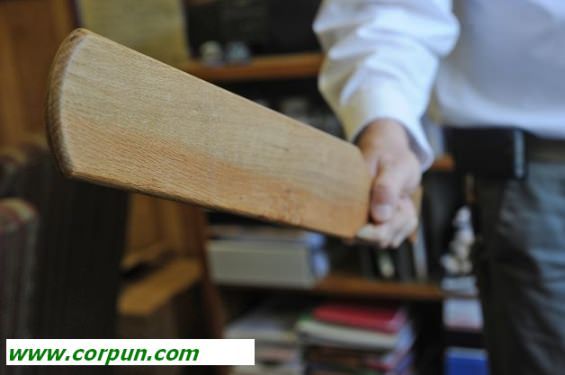
While varying methods of punishment are practiced at every
Southeast Texas school, the paddle is still used. Parents are
generally notified before corporal punishment is used on their
child. Photo taken Friday, May 4, 2012 Photo: Guiseppe
Barranco, STAFF PHOTOGRAPHER / The Beaumont Enterprise
Copyright 2012 Beaumont Enterprise. All rights reserved.
Corpun file 24003 at www.corpun.com
Shreveport Times, Louisiana, 19 May 2012
Corporal punishment in schools: Does hitting help?
By Alison Bath
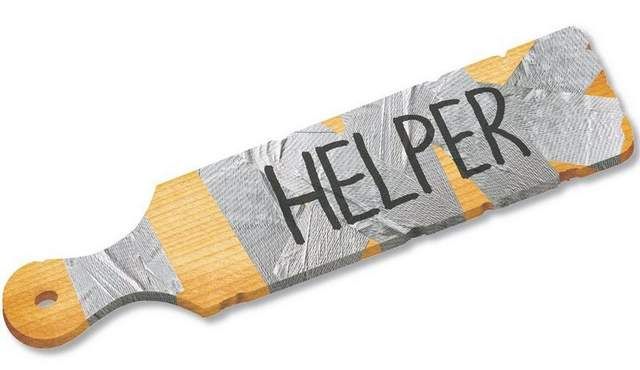
Photo illustration based on a police report description of the paddle used in a November paddling of a Woodlawn High School student. David Wright / The Times
When a Woodlawn High School student left the school's gym
without permission in November, football coach DeCarlos Holmes
decided the young man needed to be disciplined.
Upon the student's return, Holmes pulled out a wooden paddle -- wrapped in gray tape and marked with the word "Helper" -- and gave the teen "three licks," according to a Nov. 10 Caddo Parish Sheriff's Office report. The student also said Holmes "cussed him and slapped him in the face with an open hand," the report states.
 Click to enlarge |
Holmes, who denies slapping the student, says he was doing his job. As a "designated" disciplinarian, it was Holmes' responsibility to paddle unruly students, he says.
"The board (paddle) of education never hurt anybody,"
said Holmes, 36, who was arrested and charged with misdemeanor
battery after the Nov. 1 paddling. In self-defense, Holmes said
he pushed the student off of him after the young man became angry
and confrontational. The coach, who no longer works for the
district, faces a June 14 trial. Caddo Parish School Board
officials declined to comment on the case.
While the circumstances surrounding the paddling may be unusual, the use of corporal punishment to correct a Caddo student's behavior isn't.
This year, at least 584 Caddo school children have been on the
receiving end of a paddle. Last year, the number was 948,
according to a Caddo Parish School Board report. During the
2009-10 school year, the U.S. Department of Education reports,
1,215 Caddo students received corporal punishment. That earned
the district -- one of the largest in the state -- the
distinction of being a statewide leader in paddling, U. S.
Department of Education data show.
Caddo officials say the district's declining use of corporal
punishment chiefly is because of a push to use positive
discipline methods, such as earning special privileges or treats
for good behavior. Additionally, the placement of more behavior
interventionists at schools to decrease suspensions also has
influenced alternatives to corporal punishment.
"We increased those numbers (of behavior interventionists)
so we could get the kids earlier, so it wouldn't lead to
out-of-school suspensions, it wouldn't lead to paddling, it
wouldn't lead to any of those things that are seen as a
"last resort," Superintendent Gerald Dawkins said.
"The key is prevention, and if we are able to apply
preventive techniques, then we move away from this kind of thing."
South leads
But depending on parent preferences and the
"culture" of the school community, corporal punishment
is sometimes used to quickly address discipline problems and
return a student to the classroom, said Carla Moore, attendance director.
"This is a measure of discipline that many parents may
employ at home and therefore they feel like if something comes up
at school, they feel that the principal should take that measure
with their children," said Moore, who noted even though it's
not required by state law, many principals ask parents to sign a
form indicating whether they want corporal punishment used as
discipline for their child.
Corporal punishment such as hundreds of Caddo students experience
each year -- three swats with a wooden paddle on the backside of
a student -- is banned in most of the nation's states. However,
19 states, including Louisiana, still allow it, according to The
Center for Effective Discipline.
Nowhere is its use more prevalent than in the South, the
organization points out. Together -- Alabama, Arkansas, Florida,
Georgia, Kentucky, Louisiana, Mississippi, North Carolina, South
Carolina, Tennessee and Texas -- accounted for 90 percent of all
instances where students were physically punished during the 2006
school year, according to the latest data available from the DOE.
That use of corporal punishment is rooted in a strong Bible-belt belief in the proverbial "spare the rod and spoil the child," says George Holden, a Southern Methodist University psychology professor.
It's reinforced by Southern sensibilities that favor obedience
and respect for authority, a lack of education about the harmful
effects of spanking and the fact that few people speak out
against the practice, Holden says.
"Most people were spanked when they were kids, and they
think that's the proper way to discipline," said Holden,
chair of the 2011 Global Summit on Ending Corporal Punishment and
Promoting Positive Discipline. "They make the erroneous
correlation that spanking equals good discipline, and if a child
isn't behaving, he must not have been spanked enough -- that's fallacious."
But some parents and school workers say corporal punishment -- used sparingly and appropriately -- can be an effective discipline tool.
The key is being aware of the backgrounds and needs of your
students, says Priscilla Pullen, a principal at Midway Elementary
Professional Development School in Shreveport. For some children,
a paddling might put an end to a discipline problem, while for
others it could add fuel to the fire, Pullen said.
"I believe in spanking because I'm from the old school, but
it's my last resort," said Pullen, who finds the
"threat" of a paddling is an effective motivation tool.
"You must know your children. You must be able to tell a
behavior problem from I got a problem at home, I need help. The
honest truth is love will conquer all discipline problems."
Policies lacking
The Department of Education has not released complete figures
for 2009, but a previous data release shows 223,190 students were
physically disciplined nationwide in 2006. That was down 18
percent from 2004 and part of a continual decline since 1976 when
1.5 million school children received corporal punishment, the data show.
A majority of those students, the statistics reveal, were boys
and many of them were black. The percentage of black children
paddled grew from 29 percent of all students receiving corporal
punishment in 1976 to 36 percent in 2006.
In 2006, Mississippi had the highest percentage of its students
who were paddled. Arkansas, Alabama, Oklahoma and Louisiana
rounded out the top five. In sheer numbers, Texas topped the list
with 49,197 students receiving corporal punishment. Mississippi
was second with 38,131 and Alabama came in third with 33,716.
Louisiana had 11,080 that same year.
Those numbers, Mississippi attorney Joseph R. Murray III says,
are evidence that the use of corporal punishment is arbitrary,
discriminatory and, in some cases, excessive.
Teachers and others authorized to administer corporal punishment
aren't trained, policies and procedures are lacking and the use
of corporal punishment varies from school district to school
district and school to school, says Murray, who represents two
young men he says were left injured in separate paddling cases.
For example, a Southern Poverty Law Center report found that
while 27 Florida school districts banned corporal punishment,
another 29 allowed it. Five others deleted the language from
their policies but didn't formally ban, and six kept the language
but didn't paddle students.
That trend also is evident in Louisiana where most of the state's
largest school districts -- except for Caddo and Jefferson --
don't use corporal punishment. In Caddo Parish, principals and
other administrators receive training on discipline policies and
rules but don't get any precise instruction on how to administer
a paddling, Moore said.
Furthermore, while the district's policy authorizes the use of
corporal punishment and requires a witness, it does not outline
the specific offenses for which a student might receive a
paddling.
Even so, corporal punishment wouldn't be used for small
infractions, such as talking in class or failing a test, Moore
said. Most often a student would be paddled to avoid an
out-of-school suspension for offenses such as fighting or showing
aggression toward students, she said.
Paddling lawsuits
The problem is further exacerbated because there is little
recourse should a student be injured. That's because school
personnel, carrying out punishment in the course of their
official duties, often are protected from criminal and civil
liability, Alabama attorney Gregory Yaghmai says.
"If you are private citizen and you work at Walmart, you
have no immunity; but if you are a school teacher, you do,"
said Yaghmai, who represents Payton Lewis, an Alabama student who
was paddled in 2010 by his science teacher for receiving a
failing grade on a test. A spokesman for the Dekalb County Board
of Education would not comment on the case. "The law,
sometimes, is not favorable to the student," he said.
Yaghmai, Murray and other attorneys have nonetheless filed
suits on behalf of students using other legal strategies.
For example, Murray filed a suit on behalf of one of his clients
alleging several civil rights violations, including the use of
corporal punishment is discriminatory because more boys than
girls are subject to the discipline method. That, the lawsuit
says, is a violation of protections guaranteed under the 14th
Amendment's equal protection clause.
Mississippi isn't the only state to experience recent problems
with corporal punishment, which in many instances parents
frequently learn happened after their children have been paddled.
Payton Lewis, 13, of Alabama, was left severely bruised,
humiliated and traumatized after a 2010 paddling by his science
teacher for receiving a failing grade on a test, Yaghmai said. In
July, Lewis' mother sued the Dekalb County Board of Education,
claiming her son's civil rights were violated by a teacher who
has a history of indiscriminate and inappropriate discipline
actions. Attorneys for the school board have asked that the case
be dismissed. Dekalb County Board of Education officials would not comment on the case.
In Williston, Fla., the mother of a 5-year-old boy with ADHD
alerted child protective authorities after a February 2011
paddling required a doctor's care. The boy, who suffered welts
and bruising, was paddled by his school's principal because he
allegedly hit another student while on the school bus. Tenika
Jones, who disputes her son purposefully hit the other boy, says
a child protective worker told her the discipline was "wrong
and that she could press charges."
A Shreveport middle school student diagnosed with autism was
paddled in August 2006 by a principal in violation of the
student's behavioral modification plan. The incident left the
student emotionally and psychologically injured resulting in
educational and other setbacks, says Shreveport attorney Jim
Gardner, who represented the student and his family in a
successful lawsuit against the district. Caddo officials declined to comment on the lawsuit.
Deb Sendek, spokeswoman for The Center for Effective Discipline,
says those situations are examples of an ineffective method of
disciplining children that makes them vulnerable to physical and emotional harm.
"What we know is that hitting, spanking and paddling are not effective to teaching children consequences," Sendek said. "What we want to teach children is to internalize their choices to make good decisions without the threat of physical punishment."
At least 113 countries -- including Afghanistan, China, Denmark,
Germany, Israel, Kenya and the United Arab Emirates -- have
banned corporal punishment in schools. Of those, 31 prohibit its
use by parents and others, as well, the Center for Effective Discipline says.
Similar efforts to ban paddling in U.S. schools have fallen
short. U.S. Rep. Carolyn McCarthy, D-N.Y., has twice sponsored
failed bills -- in 2010 and 2011 -- that would have prohibited
the use of corporal punishment in schools nationwide.
Likewise, similar recent legislative initiatives in Texas and
Florida have gained little support. A 2009 bill, sponsored by
state Rep. Barbara Norton, D-Shreveport, to prohibit corporal
punishment in Louisiana's elementary and middle schools never made it out of committee.
Despite those defeats, Dawkins envisions a time when corporal
punishment no longer will be used in Caddo Schools -- likely as a
result of wider acceptance of positive, long-term behavior modification alternatives.
"I see a day when paddling will no longer be an
option," Dawkins said. "Parents will probably say
that's not what I choose to have done."
Corpun file 24006 at www.corpun.com

newschannel6now.com (KAUZ-TV), Wichita Falls, Texas, 21 May 2012
Principal Certificate Suspended After Paddling Incident
By Crystal Hall
Newschannel 6
New developments in the case of a Quanah High School Principal accused of paddling a student too hard. Newschannel 6 has learned Principal Rusty Brawley's certificate has been suspended. The Texas Education Agency suspended his certificate effective April 23, 2012.
The first is a probated suspension on his teaching certificate. That means he can teach but he will be under supervision for three years and must follow TEA suspension guidelines. His other suspension is under his principal license. For the next year he can't serve as a principal. That doesn't mean he has to leave the district. It's up to school officials to decide his fate.
If you recall the TEA investigation began because of an incident that happened in November when a student was called into Principal Brawley's office after talking back to a teacher. The student had an option, ISS or licks. He chose the paddle.
After leaning up against a table, fully clothed, Principal Brawley paddled him twice. He was hit so hard shades of red and purple covered his buttocks, making it impossible for him to move.
That's when the child's legal guardian took action. He was sent to the doctor, the Texas Department of Family and Protective Services was called and the TEA began investigating the case.
During our own investigation we found that Brawley had a former run in with law enforcement. It was a case of domestic assault in Lubbock County in the spring of 2010.
For the mother of the child who suffered the wounds the punishment and accountability Principal Brawley received is enough to "satisfy her."
Newschannel 6 made several attempts to contact Superintendent Buddy Freeman about Brawley's future at the school. Those messages and phones calls were not returned.
All content © Copyright 2000 - 2012 WorldNow and KAUZ. All Rights Reserved.
RELATED VIDEO CLIP
Three-minute news report from KAUZ-TV News Channel 6, Wichita Falls, TX (22 May 2012), of which the above is a heavily abbreviated text version. Includes pictures of bruises (tendentiously described by the reporter as "wounds") allegedly on the buttocks of the boy who was paddled.
HERE IS THE CLIP:
This video clip is not currently available.
IMPORTANT: Copyright in this video material rests with the original copyright holders. This brief excerpt is reproduced under the "fair use" doctrine
for private, non-profit, historical research and education purposes only. It must not be redistributed or republished in any commercial context.
Corpun file 24004 at www.corpun.com
Shreveport Times, Louisiana, 21 May 2012
Mixed views held on paddling's influence
By Alison Bath
"Paddling in and of itself is not a cure-all of
anything but when supported with parental direction and
relationship between the school and the home it can add to a
kid's maturation process."
-- Caddo Parish Schools Superintendent Gerald Dawkins
Frederic Washington estimates he was paddled at least 30 times as a student in Caddo schools. That corporal punishment -- given for a variety of reasons from not doing his homework to talking back or being disruptive -- did little to change Washington's behavior, he says.

"It became so routine I would actually wear layered clothes to school because I knew I would get corporal punishment that day," said Washington, 23, who attended Vivian Elementary School and Caddo Middle Career Technology School, graduating from Booker T. Washington High School in 2007.
It was only after Washington was suspended and could not return until his mother came back with him that the then-middle school student got the message. His mother's reaction -- and resulting punishment -- was much worse than anything school officials meted out, he says.
Yet, Washington credits the spankings he received in school with helping make him the man he is today.
"Short-term it made me mad because I got paddled and no kid wants to get struck with a wooden board," said Washington, who graduated from LSU-Shreveport on Sunday [picture right]. "Long-term, I grew to appreciate my principals for doing that and it played a part in my eventual turnaround."
Washington's situation typifies the corporal punishment debate. On one side, Washington and others say appropriately used, corporal punishment is one method of discipline -- used along with other behavior modification tools -- that addresses a misbehaving student and quickly puts them back in the classroom. Firm-but-loving discipline not only educates a child about the consequences of bad actions, but also may be influential in assuring long-term developmental success.
"Paddling in and of itself is not a cure-all of anything but when supported with parental direction and relationship between the school and the home it can add to a kid's maturation process," said Gerald Dawkins, superintendent of Caddo Parish Schools.
But others say paddling shouldn't be allowed in schools.
Kevin Jones, program director of the LSU-Shreveport School of Psychology, says although schools function as a pseudo-parent during much of a child's day, they can't assume the "responsibilities and risks associated with physical discipline, primarily due to practical issues.
"With a class of 25 children, there is no way that a teacher can ensure that a paddling is immediate, conditional, proportionate to the offense, and delivered by a loving assistant principal," Jones said.
Psychological effects
A study published in the February issue of the Canadian Medical Association Journal suggests that physical punishment of children increases the risk of negative developmental outcomes, such as harming parent-child relationships and, in some cases, psychiatric disorders. Furthermore, the report found, there were no studies that found corporal punishment "enhanced developmental health." Studies also have linked the use of spanking to increased aggression, depression and poor scholastic performance.
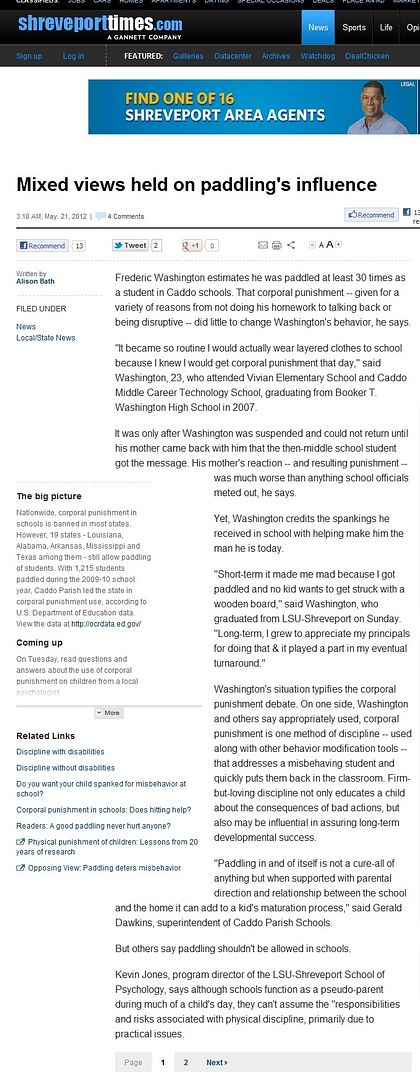 Click to enlarge |
When parents spank, they do get immediate compliance from a child, says George Holden, a Southern Methodist University psychology professor. But that short-term effect fails to acknowledge that often a parent will be forced to use physical punishment repeatedly to address the same offense. In other words: Spanking doesn't teach children how to control themselves or make positive decisions about their behavior; it just momentarily stops the misbehavior, Holden says.
"Kids are focusing on 'my parent hurt me,' (they are) not focusing on their misbehaving or learning to accept the parent's message," Holden said.
But Jones points out there are studies that seem to indicate that mild, non-abusive spanking by loving parents isn't harmful to children. Research also supports the notion that "conditional" spanking is as beneficial as many alternate forms of discipline, such as using a time out, he said.
Rev. Kenneth T. Whalum Jr., of Memphis, Tenn., who advocates the use of corporal punishment in schools, agrees.
"Many of these kids are out of control and what they want and what they need is love and attention," said Whalum, a member of the Shelby County Board of Education. "They interpret physical correction as love and attention and affection."
That idea is supported by Washington and other readers who responded to The Times' request for input on their experiences with corporal punishment.
"A paddling in school is one of the best things that ever happened to me," said Sue Johnson in an e-mail to The Times. "It showed me someone cared enough to notice I was being disruptive."
Some experts disagree, saying corporal punishment can make children feel bad about themselves and unworthy.
"The emotion impact is it makes the kids feel disliked," says Alvin F. Poussaint, a psychiatry professor at Harvard Medical School in Boston. "Usually if you are paddled you don't feel loved - it's very un-nurturing."
Jones says while there is little quality research to show why parents shouldn't use "conditional" spanking, that doesn't mean its use in schools should be tolerated.
"There is no evidence that corporal punishment leads to any improved educational outcomes," Jones said.
Copyright © 2012 www.shreveporttimes.com. All rights reserved.
Corpun file 24005 at www.corpun.com
Shreveport Times, Louisiana, 21 May 2012
Readers: A good paddling never hurt anyone
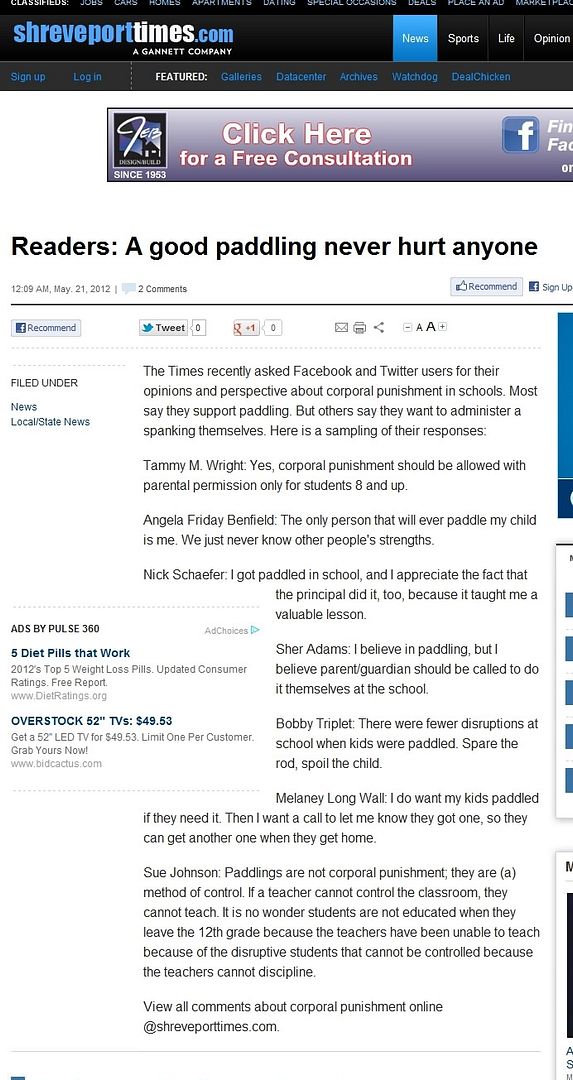 Click to enlarge |
The Times recently asked Facebook and Twitter users for their opinions and perspective about corporal punishment in schools. Most say they support paddling. But others say they want to administer a spanking themselves. Here is a sampling of their responses:
Tammy M. Wright: Yes, corporal punishment should be allowed
with parental permission only for students 8 and up.
Angela Friday Benfield: The only person that will ever paddle my
child is me. We just never know other people's strengths.
Nick Schaefer: I got paddled in school, and I appreciate the fact
that the principal did it, too, because it taught me a valuable lesson.
Sher Adams: I believe in paddling, but I believe parent/guardian
should be called to do it themselves at the school.
Bobby Triplet: There were fewer disruptions at school when kids
were paddled. Spare the rod, spoil the child.
Melaney Long Wall: I do want my kids paddled if they need it. Then I want a call to let me know they got one, so they can get another one when they get home.
Sue Johnson: Paddlings are not corporal punishment; they are (a)
method of control. If a teacher cannot control the classroom,
they cannot teach. It is no wonder students are not educated when
they leave the 12th grade because the teachers have been unable
to teach because of the disruptive students that cannot be
controlled because the teachers cannot discipline.
About this website
Search this site
Article: American school paddling
Other external links: US school CP
Archive 2011: USA
Archive 2012: USA
Video clips
Picture index
Previous month
Following month
